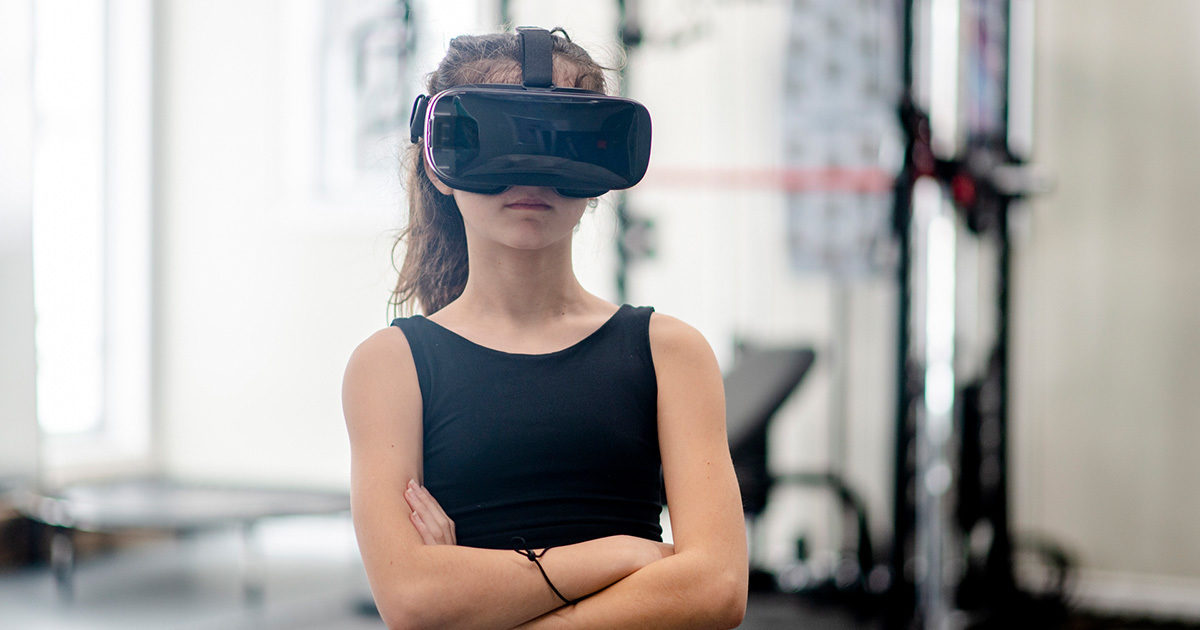Epilepsy, Video Games, and Virtual Reality
Co-founder of an Austin-based wellness gaming company funds collaborative efforts by UT Health Austin clinicians and researchers across The University of Texas at Austin to improve postsurgical outcomes in patients with epilepsy
Written by: Ashley Lawrence

UT Health Austin clinicians and researchers across The University of Texas at Austin, including those from the Dell Medical School, Moody College of Communication, and Cockrell School of Engineering, are working together to conduct a three-year study using video games and virtual reality to rewire the brains of adolescents and young adults (ages 15-20) with epilepsy who require surgery to end their seizures. The study revolves around the concept of neuroplasticity, the ability of neural networks in the brain to modify, change, or adapt to both structure and function in response to an experience, such as surgery to the brain. For this study in particular, UT Health Austin clinicians and UT Austin researchers are exploring the brain’s ability to create new pathways before the experience (or in this case, surgery) takes place.
The Dell Medical School has received a $2.5 million grant from the Coleman Fung Foundation to fund this study. Coleman Fung is the founder of the software company Open Link Financials Inc. Fung is also the Chief Executive Officer of Blue Goji, a wellness technology startup based in Austin, Texas that was cofounded by Fung and Kai Huang, the creator of Guitar Hero, an interactive video game during which players use game controllers that mimic musical instruments (e.g., guitar, drums, mic) to simulate playing music for an audience.
In addition to grant funding, the Dell Medial School will also receive two of Blue Goji’s Infinity treadmill virtual reality gaming systems to use in the study. Blue Goji combines technology, gaming, and fitness to make developing healthier habits a fun and engaging experience for users. Working with scientists, doctors, and innovators, this startup has created a form of fitness gamification that utilizes the latest virtual reality and gaming technology to create the tools for a disease management platform. The unique controllers and games work directly with standard cardio equipment with the goal of this form of gameplay being to potentially change the lives of those with chronic conditions. Additionally, the team at Blue Goji has been actively seeking new ways to address brain health issues. “It’s a perfect synergy,” says Fung.
Researchers have been studying neuroplasticity for decades; however, the plan is for this study to actually implement that research. Prior to surgery, the enrolled participants will have the area of their brain where the seizures are occurring mapped to see what functions are located there, such as motor functions of speech and language. Each participant will have a regimen of video games created specifically to address the functions that are affected in the site of their epilepsy.
These specialized video games will be played on Blue Goji’s Infinity treadmill, which will allow clinicians and researchers to identify in real-time how the area of the participant’s brain is functioning and whether they can change where certain functions occur in the brain. The clinicians and researchers will be able to send the brain feedback using sensors and virtual reality while the participant is playing the game to attempt to get the brain to perform those functions in a different area.
José del R. Millán, PhD, a professor in both the Dell Medical School Department of Neurology and the Cockrell School of Engineering whose research is in brain-computer interfaces, compare this method to the way Olympic athletes visualize making a jump or taking off from the starting block before they physically execute the action. Millán has worked in Italy and Switzerland as well as at universities, such as Stanford University and the University of California Berkeley, and believes this research is setting the foundation for a bigger vision. “This is a lifetime program,” says Dr. Millán. “It’s the reason I came to Austin in the first place, to accelerate this process and…have the necessary expertise in one place, in Austin. This is unique.”
If researchers are able to observe these functions beginning to occur in a different area of the brain, the hope is that the brain will remember this new pathway and begin to use it after the surgery for the epilepsy has taken place. Ideally, this will lessen the amount of permanent damage caused by the surgery and reduce the therapies needed post-surgery.
“If we understand the brain’s circuits and neuroplasticity, could we protect the brain’s healthiest areas?” proposes UT Health Austin board-certified neurologist David Paydarfar, MD, who is leading this study. Dr. Paydarfar serves as the Director of UT Health Austin’s Mulva Clinic for the Neurosciences and the Chair for the Dell Medical School Department of Neurology. He is also a professor in the Dell Medical School Department of Neurosurgery.
As this study has piqued the interest of clinicians, scientists, and researchers from around the world, Dr. Paydarfar is hopeful that, if rewiring the brain in this way is successful, a center can be created that will not only allow this technique to become more widely available to patients with epilepsy in Central Texas and beyond, but also expand research efforts to address other brain conditions, such as Alzheimer’s disease, Parkinson’s disease, stroke, and post-traumatic stress disorder.
Dr. Paydarfar is working closely with UT Health Austin board-certified pediatric neurosurgeon Elizabeth Tyler-Kabara, MD, PhD, who serves as both the Chief of Pediatric Neurosurgery and the Co-Chief of Pediatric Neuroscience in the Pediatric Neurosurgery Clinic within UT Health Austin Pediatric Neurosciences at Dell Children’s, a clinical partnership between UT Health Austin and Dell Children’s Medical Center. She is also an associate professor in the Dell Medical School Department of Neurosurgery.
UT Health Austin Pediatric Neurosciences at Dell Children’s diagnoses, treats, and manages the care of children and adolescents with conditions affecting the brain and central nervous system, and the Mulva Clinic for the Neurosciences diagnoses, treats, and manages those same conditions in adult patients. The collaboration between clinicians across UT Health Austin Pediatric Neurosciences at Dell Children’s and the Mulva Clinic for the Neurosciences allows patients to experience a seamless transition from pediatric to adult care. This multifaceted continuum of care in which patient care is coordinated among care team members across cohesive clinical practices helps bridge gaps in care that these patients may otherwise face.
For more information about the Dell Children’s Comprehensive Pediatric Epilepsy Center within UT Health Austin Pediatric Neurosciences at Dell Children’s, please call 1-512-628-1855 or visit here.
For more information about the Neurology Clinic within the Mulva Clinic for the Neurosciences, please call 1-833-UT-CARES (1-833-882-2737) or visit here.
